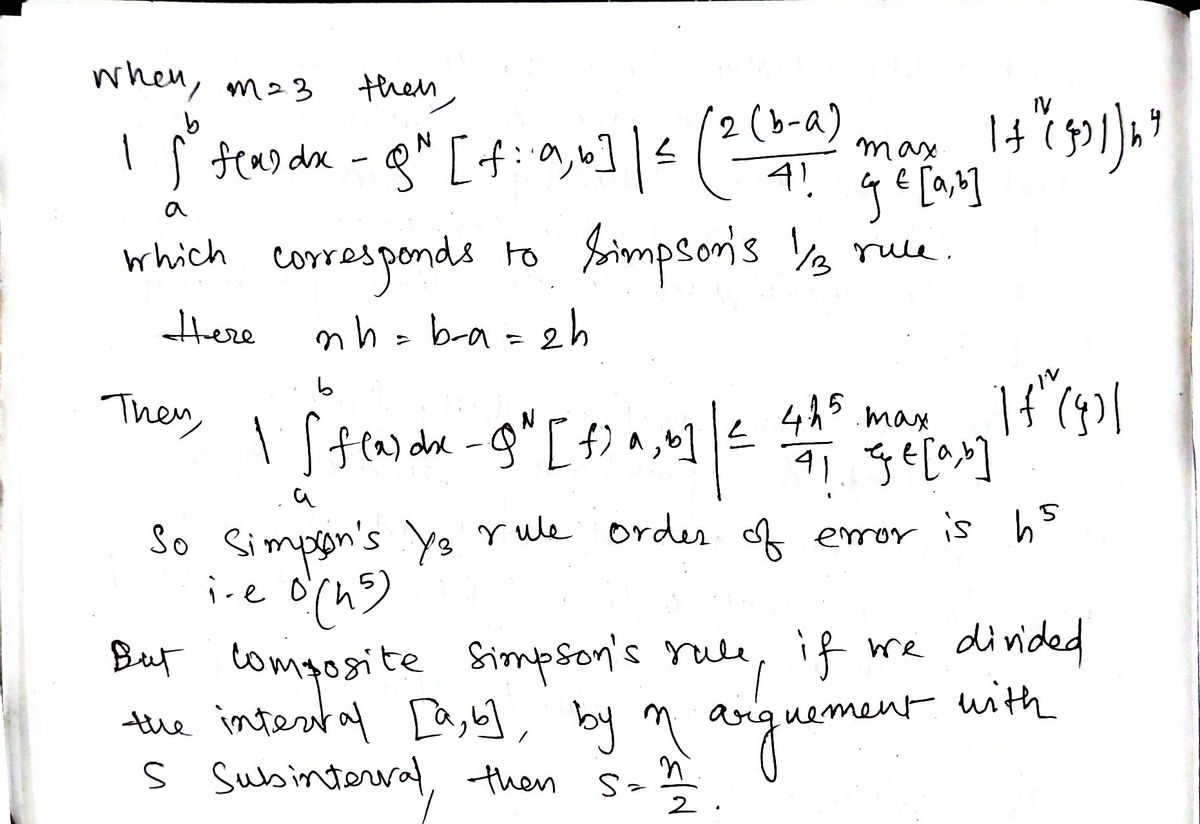In this question, you can check whether you can interpret convergence theorems in the context of numerical quadrature correctly. Theorem 7.14 states that, when a quadrature rule is exact of some degree and certain conditions hold, then the associated composite quadrature rule converges like O(hP) with a certain pen. When Q[a,b] is a quadrature rule with degree of exactness m=3 and feC³ ([a,b]), what is the largest pen Theorem 7.14 gives us for this Q and this f? Note that this task only requires you to work with Theorem 7.14. It does not require you to check whether Theorem 7.14 gives you the best possible peN by finding a counterexample. O a. p=0 O b. p=1 O c. p=2 O d. p=3 O e. p=4 O f. p=5
In this question, you can check whether you can interpret convergence theorems in the context of numerical quadrature correctly. Theorem 7.14 states that, when a quadrature rule is exact of some degree and certain conditions hold, then the associated composite quadrature rule converges like O(hP) with a certain pen. When Q[a,b] is a quadrature rule with degree of exactness m=3 and feC³ ([a,b]), what is the largest pen Theorem 7.14 gives us for this Q and this f? Note that this task only requires you to work with Theorem 7.14. It does not require you to check whether Theorem 7.14 gives you the best possible peN by finding a counterexample. O a. p=0 O b. p=1 O c. p=2 O d. p=3 O e. p=4 O f. p=5
Advanced Engineering Mathematics
10th Edition
ISBN:9780470458365
Author:Erwin Kreyszig
Publisher:Erwin Kreyszig
Chapter2: Second-order Linear Odes
Section: Chapter Questions
Problem 1RQ
Related questions
Question
Need help with this question. Thank you :)
![In this question, you can check whether you can interpret convergence theorems in the context of numerical quadrature correctly.
Theorem 7.14 states that, when a quadrature rule is exact of some degree and certain conditions hold, then the associated composite quadrature rule
converges like O(hP) with a certain pen. When Q[ · ;a,b] is a quadrature rule with degree of exactness m=3 and f=C³([a,b]), what is the largest pen Theorem 7.14
gives us for this Q and this f?
Note that this task only requires you to work with Theorem 7.14. It does not require you to check whether Theorem 7.14 gives you the best possible pen by
finding a counterexample.
O
a. p=0
b. p=1
O c. p=2
d. p=3
e. p=4
O f. p=5](/v2/_next/image?url=https%3A%2F%2Fcontent.bartleby.com%2Fqna-images%2Fquestion%2F6fe1fc35-672a-49fd-831b-9642c77888ed%2F78e3bdca-7560-4e04-8b0a-9e7b396c8bac%2Fibruci_processed.png&w=3840&q=75)
Transcribed Image Text:In this question, you can check whether you can interpret convergence theorems in the context of numerical quadrature correctly.
Theorem 7.14 states that, when a quadrature rule is exact of some degree and certain conditions hold, then the associated composite quadrature rule
converges like O(hP) with a certain pen. When Q[ · ;a,b] is a quadrature rule with degree of exactness m=3 and f=C³([a,b]), what is the largest pen Theorem 7.14
gives us for this Q and this f?
Note that this task only requires you to work with Theorem 7.14. It does not require you to check whether Theorem 7.14 gives you the best possible pen by
finding a counterexample.
O
a. p=0
b. p=1
O c. p=2
d. p=3
e. p=4
O f. p=5
Expert Solution
Step 1

Step by step
Solved in 2 steps with 2 images

Recommended textbooks for you

Advanced Engineering Mathematics
Advanced Math
ISBN:
9780470458365
Author:
Erwin Kreyszig
Publisher:
Wiley, John & Sons, Incorporated

Numerical Methods for Engineers
Advanced Math
ISBN:
9780073397924
Author:
Steven C. Chapra Dr., Raymond P. Canale
Publisher:
McGraw-Hill Education

Introductory Mathematics for Engineering Applicat…
Advanced Math
ISBN:
9781118141809
Author:
Nathan Klingbeil
Publisher:
WILEY

Advanced Engineering Mathematics
Advanced Math
ISBN:
9780470458365
Author:
Erwin Kreyszig
Publisher:
Wiley, John & Sons, Incorporated

Numerical Methods for Engineers
Advanced Math
ISBN:
9780073397924
Author:
Steven C. Chapra Dr., Raymond P. Canale
Publisher:
McGraw-Hill Education

Introductory Mathematics for Engineering Applicat…
Advanced Math
ISBN:
9781118141809
Author:
Nathan Klingbeil
Publisher:
WILEY

Mathematics For Machine Technology
Advanced Math
ISBN:
9781337798310
Author:
Peterson, John.
Publisher:
Cengage Learning,

